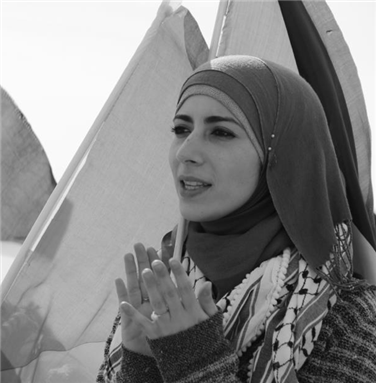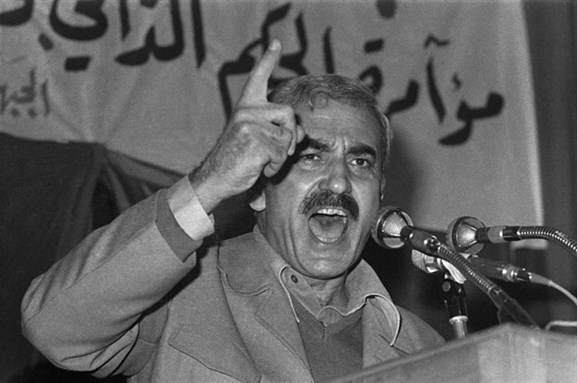[This post is part of an ongoing Profile of a Contemporary Conduit series on Jadaliyya that seeks to highlight distinct voices primarily in and from the Middle East, North Africa, and South Asia.]
Jadaliyya (J): What do you think are the most gratifying aspects of Tweeting, and Twitter?
Linah Alsaafin (LAS): Twitter is a great aspect of citizen journalism. It brings worlds closer, in the sense that people living in different countries can easily interact with each other. One highlight is that mainstream media outlets now consider certain Twitter sources as reputable, such as Robert Mackey from the New York Times blog, The Lede, who uses Storify to recount events, including when Mustafa Tamimi from Nabi Saleh was killed on 9 December 2011. Twitter is also used to call out and express views against what is officially parroted out to media by the abysmal Palestinian and Israeli leadership. There’s little chance of being censored by Twitter in such cases.
J: What are some of the political/social/cultural limits you’ve encountered using platforms like Twitter, and blogs like Electronic Intifada? How would you compare it to your work for Al Jazeera and Al-Monitor?
LAS: I think Twitter was first used by Palestinians to inform the world of what was happening on the ground, about the Israeli occupation policies and how they affect Palestinian communities and individuals. That widened to include other Palestinians within the information sphere, where it created a loose band of mutual connections: a network. You have Palestinians communicating and relaying updates from protests, their thoughts, jokes, and articles to each other from Gaza, the West Bank, the ’48 territories, and those in exile. Twitter is a reflection of the occupation-imposed Palestinian geographical and cultural fragmentation, and an attempt to weld this division by closing the gap through cyberspace. When events take place in Jerusalem, we know who we can count on and to follow for updates, as in Gaza and the West Bank.
Socially speaking, I’ve had the pleasure of encountering many of the Palestinian Tweeps face to face after getting to know them exclusively from Twitter, whether from protests, meetings, or a simple hang out. I’ve traveled to Gaza twice since November 2012 and was “reunited” for the first time with young women and men who I came to intimately know from their writings, blogs, and Twitter. Likewise, it is also gratifying meeting activists from Umm al-Fahem, Haifa, or Jerusalem. It’s a surreal feeling, and a minor victory that we owe to our utilization of social media to rebuild these splintered connections with each other. It opens up your mind to other realities as well, as you learn of the daily reality and experiences of your friends that carry different color-coded Israeli military-issued ID cards.
Electronic Intifada is different from Al Jazeera, Al-Monitor, and Al Akhbar English in that in addition to writing articles and conducting interviews, I also blog for EI. With blogging, I can write pretty much whatever I want, such as my thoughts and feelings on a particular protest, describing firsthand my experiences with the Israeli occupation and the PA repression, etc. It’s more liberating in that sense, as readers get a good grasp of where my politics and thoughts very clearly lie. I incorporate my personal accounts and experiences into my blogs, and can comfortably rant against the PA and use “strong language,” such as describing them as collaborators led by a quisling without worrying about getting censored or for the post to be deemed “inappropriate.” With the other three outlets mentioned above, it’s strictly about the traditional journalistic writings, reports and such.
J: In your experience and use of social media, do you feel it helps mobilize or disorganize? Focus or crowd? Is it manageable or noisy? Can it help persuade and mobilize or does it turn everyone into a voyeur and spectator?
LAS: There isn’t a correct answer for this; it can go both ways. It can organize as we’ve witnessed with the worldwide trending campaigns in support of the Palestinian hunger strikers, especially Samer Issawi, and it can disorganize due to a simple misunderstanding. We always have to be aware of verifying information before sharing it, because there are serious repercussions when it comes to sharing archived photos, false news, and rumors with your followers and the social media world – whether intentionally or not. One example is when UN employee Kholoud Badawi accidentally tweeted a photo of a Palestinian girl killed on the presumption that it was a picture from an Israeli air strike the same day. The Israeli officials hounded her online and pressured the UN to fire her.
Social media can mobilize people, but in my opinion it should be backed with on-the-ground experience. There’s no problem in being a Twitter activist and an activist on the ground, but the two tend to collide. In larger demonstrations, it is preferable to have organized previously with a communications team whose role is to provide live updates, live streaming, photos, etc. If everyone wants to protest then we will end up relying on reporters and not from those on the ground, and if everyone at the protest is tweeting then there will be redundant and an overload of information echoed out. The key is to find the balance, to organize and to coordinate with one another.
J: In one of your recent articles, you describe the havoc that Israeli settlers and soldiers have wreaked upon the family and property of Khaled Daraghmeh, a Palestinian farmer in the West Bank. Do you think the increasing international attention to settler crimes and to the illegality of Israeli settlements will spur better protections for Palestinians under occupation? Why or why not?
LAS: The international community is characterized by one word, and that is complicity. They can write up hundreds of human rights reports, issue a million condemnations and express as many regrets over the Israeli occupation’s policy. But unless they take up serious measures to bring Israel to accountability – such as sanctions against the occupying entity and divestment from companies that profit from the occupation, in addition to somehow finding a way to debase the US veto against any punitive action against Israel – they will remain complicit in the occupation and international law will further be cemented as a farce for the Palestinians.
J: A number of your pieces have detailed the complicity of the Palestinian Authority in the occupation, including their inaction regarding settler violence, their welcoming of Obama despite his continued military and economic support for Israel, and the PA`s repression of Palestinian demonstrators. In your opinion, is the PA reformable? And if not, what steps must be taken to challenge the PA effectively?
LAS: The PA is absolutely not reformable. There is no middle ground on this. Its sole existence was to maintain the security interests of Israel while pacifying Palestinians under limited self-rule. It is increasingly clear that in order for another uprising to happen, the collaborative PA must be dealt with an existential blow. I believe we are still years away from this point, as the current general disgruntlement and fear of repression from the PA must be channeled into awareness for its abortive role in Palestinian liberation and self-determination, which will naturally lead to action-oriented measures. However, as more than 750,000 Palestinians are dependent on the PA for their livelihoods (and that number is obviously higher when you include their families), this will take some time to undertake and initiate alternatives. People will ask, “What happens after you dissolve the PA? Will we be left in a political vacuum?” But getting rid of the PA is a revolution in itself, and in revolutions, alternatives are never previously and calculatingly planned out. The whole point of raising awareness on a collective front is to ensure that we won’t become victims of another native subcontractor for the Israeli occupation. By targeting the PA, we would have targeted a significant extension of the occupation itself. Getting rid of one autocratic system is never achieved by peaceful measures alone. This is the same PA that has recognized Israel’s right to exist, transformed the national narrative into a meaningless Bantustan and largely symbolic state on 16 percent of the West Bank, and works effusively with the Israeli army to crush dissent and maintain the status quo. So calling for burning the PA ministries, for example, is not a hedonistic and uncivilized or exaggerated act, precisely because they symbolize the subjugation of Palestinians from resisting actively against the occupation.
J: One of your most recent articles on Electronic Intifada detailed the comments of a Palestinian heckler living inside Israel/the `48 Palestinian Territories. What role, if any, do you see for Palestinian citizens of Israel in the movement for liberating Palestine? What separates them from Palestinians in the OPT, and what separates them from Israeli Jews?
LAS: As a person living in the West Bank, I cannot dictate what the role for Palestinian citizens of Israel should be. Their reality is much different from mine, and more complicated. What is classified as “normalization” for me doesn’t necessarily apply to them, as they live as a minority, the fifth column within Israeli society, and are forced to rely on the Israeli government for services in their day-to-day lives. What is crucially important, however, is the knowledge and awareness of where they stand in Israel, and that is as second or third class citizens with over 50 Israeli government laws that discriminate against them, purely for being Palestinian Arabs. Living within this institutionalized racist society should be highlighted by civil disobedience, and overt normalization projects such as a joint Israeli-Palestinian art exhibition for example should be battled. A special shout out goes to the youth of the third generation refugees of the village of Iqrith who have admirably taken matters into their own hands and physically returned to set up and maintain life there. It is highly important for Palestinians outside the ’48 territories to coordinate with them in various ways in order to maintain the connection and unity of the Palestinian people as one, all oppressed by the same military occupation regime.
[Linah Alsaafin tweets at @LinahAlsaafin and blogs at the Electronic Intifiada.]











.jpg)




